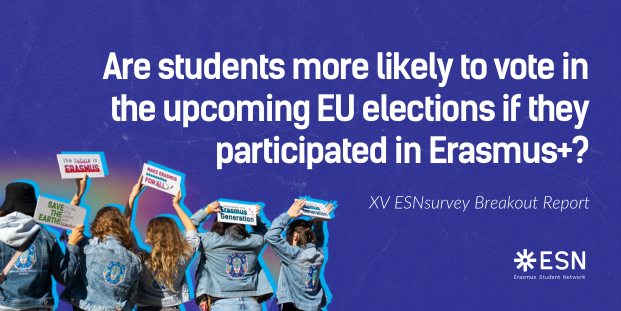
Just a few days before the EU elections in 2024, it’s important to reflect on the achievements of one of the European Union's most successful initiatives, the Erasmus+ programme.
With this, the Erasmus Student Network has elaborated “Participation in Learning Mobility as a Driving Force to Change the European Union”, a breakout report of the XV ESNsurvey. This report aims to determine whether participation in international mobility, particularly through the Erasmus+ programme, is a decisive factor in making students more engaged in society and more likely to participate in the upcoming EU elections. Additionally, this report gathers information about their perspectives on the priorities for the next mandate of the European Institutions and compares these findings with other relevant sources, such as the Eurobarometer.
Through this report, you will analyse the following key findings:
- Before and After Mobility – Erasmus+ Students’ Citizenship
- Voting Intention in the EU Elections
- Importance of EU Policies
The conclusions drawn from this report indicate that participation in international mobility programmes, such as Erasmus+, enhances the sense of the European Union citizenship, as well as the broader perception of citizenship at the city, European, and global levels.
Even one year before the elections, a vast majority of mobility participants eligible to vote in the EU elections expressed interest in exercising their voting rights. This is a positive indication of young people's engagement in the upcoming elections.
Regarding the priorities for Parliamentary candidates and the next Commission, the participants highlighted the importance of exchange opportunities, digital transformation, the role of Europe in the world, and freedom of movement.
-------------------------------------------------
ESNsurvey is a European-wide research project implemented by the Erasmus Student Network, covering different topics related to international student mobility. Being one of the biggest student-led initiatives of its kind, it has inspired ESN’s international student representation and advocacy efforts to improve the access, experience, and impact of mobility since its first implementation in 2005.


Follow ESN